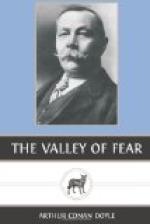“Well, unless he has a burrow close by or a change of clothes ready, they can hardly miss him. And yet they have missed him up to now!” Holmes had gone to the window and was examining with his lens the blood mark on the sill. “It is clearly the tread of a shoe. It is remarkably broad; a splay-foot, one would say. Curious, because, so far as one can trace any footmark in this mud-stained corner, one would say it was a more shapely sole. However, they are certainly very indistinct. What’s this under the side table?”
“Mr. Douglas’s dumb-bells,” said Ames.
“Dumb-bell—there’s only one. Where’s the other?”
“I don’t know, Mr. Holmes. There may have been only one. I have not noticed them for months.”
“One dumb-bell—” Holmes said seriously; but his remarks were interrupted by a sharp knock at the door.
A tall, sunburned, capable-looking, clean-shaved man looked in at us. I had no difficulty in guessing that it was the Cecil Barker of whom I had heard. His masterful eyes travelled quickly with a questioning glance from face to face.
“Sorry to interrupt your consultation,” said he, “but you should hear the latest news.”
“An arrest?”
“No such luck. But they’ve found his bicycle. The fellow left his bicycle behind him. Come and have a look. It is within a hundred yards of the hall door.”
We found three or four grooms and idlers standing in the drive inspecting a bicycle which had been drawn out from a clump of evergreens in which it had been concealed. It was a well used Rudge-Whitworth, splashed as from a considerable journey. There was a saddlebag with spanner and oilcan, but no clue as to the owner.
“It would be a grand help to the police,” said the inspector, “if these things were numbered and registered. But we must be thankful for what we’ve got. If we can’t find where he went to, at least we are likely to get where he came from. But what in the name of all that is wonderful made the fellow leave it behind? And how in the world has he got away without it? We don’t seem to get a gleam of light in the case, Mr. Holmes.”
“Don’t we?” my friend answered thoughtfully. “I wonder!”
Chapter 5 — The People of the Drama
“Have you seen all you want of the study?” asked White Mason as we reentered the house.
“For the time,” said the inspector, and Holmes nodded.
“Then perhaps you would now like to hear the evidence of some of the people in the house. We could use the dining room, Ames. Please come yourself first and tell us what you know.”
The butler’s account was a simple and a clear one, and he gave a convincing impression of sincerity. He had been engaged five years before, when Douglas first came to Birlstone. He understood that Mr. Douglas was a rich gentleman who had made his money in America. He had been a kind and considerate employer—not quite what Ames was used to, perhaps; but one can’t have everything. He never saw any signs of apprehension in Mr. Douglas: on the contrary, he was the most fearless man he had ever known. He ordered the drawbridge to be pulled up every night because it was the ancient custom of the old house, and he liked to keep the old ways up.




